Newly Elected Board Members
Director of Social Science
This seat represents fields such as psychology, sociology, anthropology, and economics. Other disciplines that also fall under social sciences may include geography or history and information systems. The representative brings insights into human behavior, societal structures, and cultural dynamics, all contributing to social behavior and social impact.
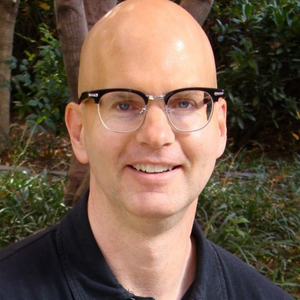
Kirk Warren Brown
United States
Statement of Interest
I am a social psychologist by training, and began working in the field of Contemplative Research as a post-doc at the University of Rochester, publishing my first paper on mindfulness in 2003 (before many psychologists knew what mindfulness was, as I discovered on the job market!). I have devoted much of my research to this topic since that time. Broadly speaking, my work centers on the importance of awareness of internal states and behavior to healthy human functioning, with a particular interest in the value of mindfulness training to enhance emotional well-being and social, or collective well-being. I have authored over 100 scholarly articles on these topics and have been senior editor on three handbooks, including a second edition of the Handbook of Mindfulness, to be published in 2025.
For many years I served on the Board of Directors of a Buddhist center in Virginia and therein accrued valuable experience in working with others to run a non-profit organization devoted to contemplative study and practice. Fostering an inclusive, productive board environment was particularly important to me in this role, including the many opportunites to help align different perspectives and promote consensus. I have also served on the Membership Committee at ISCR for the past two years, where I have been contributing to the expansion of our outreach to prospective members and to creating a new webinar series that will feature contemplative research from across the wide spectrum of disciplines that ISCR seeks to represent.
I want to serve on the ISCR Board to nurture its ongoing development into a strong advocate for contemplative science and scholarship. I believe that our collective efforts in these areas have great potential to benefit our various disciplines and the wider communities we wish to serve through our work. I have a special interest in supporting new and early stage investigators in contemplative research, and will devote particular attention to bringing undergraduate and graduate students, post-docs, and junior faculty into ISCR by creating opportunities to showcase their work, receive mentorship and guidance from established researchers, and lower barriers to participation. I also want to enhance the profile of the social sciences in ISCR, to demonstrate how our collective well-being and welfare may be served through contemplative research.
I believe that ISCR, still in its infancy as an organization, is poised to become a significant force in expanding the reach of contemplative research, and I am excited to bring to the Board my organizational experience and passion for contemplative research to support its work.
Director of Clinical Sciences
Occupants of this seat are professionals from medical and health-related disciplines, including medicine, nursing, and allied health fields. This seat can also represent clinical psychology and its application in health and wellbeing. The representative provides expertise on issues such as patient care, clinical research, and healthcare systems, informing decisions on health policies and standards of clinical practice.
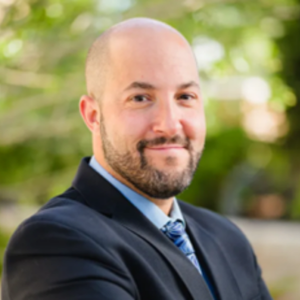
Eric Garland
United States
Statement of Interest
The purpose of this letter is to express my intention to be considered for a Director of Clinical Science position with ISCR. My nearly 20-year career as a clinical scientist has been motivated by compassion. Driven by the desire to alleviate human suffering, I obtained training in psychotherapy, integrative behavioral treatment development, affective science, psychophysiology, and the science of addiction and chronic pain.
Currently, I serve as Endowed Professor in Health Sciences at the Sanford Institute for Empathy and Compassion, Professor in the Department of Psychiatry and the Center for Addiction Science and Treatment at the University of California San Diego, and Director of UCSD ONEMIND (Optimized Neuroscience-Enhanced Intervention Design). Formerly, I served as Distinguished Professor, Distinguished Endowed Chair in Research, and Associate Dean for Research at the University of Utah College of Social Work, and Director of the Center on Mindfulness and Integrative Health Intervention Development. The overarching goal of my research agenda is to translate findings from contemplative science and neuroscience into clinical interventions for addiction, emotional distress, and chronic pain. In that regard, I am the developer of Mindfulness-Oriented Recovery Enhancement (MORE), a novel, neuroscience-informed mind-body therapy that integrates training in mindfulness, reappraisal, and savoring of natural rewards. MORE has one of the strongest evidence bases for a contemplative clinical intervention; as a PI, MPI, or Co-Investigator on >$90 million in federally-funded research grants, to date I have tested MORE in 13 randomized clinical trials (RCTs) involving more than 1300 patients. To complement my expertise in contemplative clinical research, I am a licensed psychotherapist with over 20 years of clinical experience working with patients suffering from a wide array of substance use disorders, psychiatric disorders, and chronic pain conditions. I have provided mindfulness-based therapy, cognitive-behavioral therapy, and clinical hypnosis for these patients in various mental health and integrative medicine settings. Finally, I have an 18-year track record of teaching and more than a decade of mentoring experience; most notably, as Distinguished Professor and Associate Dean for Research, I have had the opportunity to foster the development of many doctoral students, postdoctoral fellows, and junior faculty as scientist-clinicians and NIH-funded researchers. In recognition of my clinical science leadership, in 2019 I was appointed by NIH Director Dr. Francis Collins to the HEAL Multidisciplinary Work Group comprised of national experts in pain and addiction research to guide the $2+ billion NIH HEAL initiative to halt the opioid crisis.I have had a significant impact on contemplative research. To date, I have had over 260 peer-reviewed manuscripts accepted for publication. According to two bibliometric analyses of the mindfulness research published over the last 55 years Baminiwatta & Solangaarachchi, 2021; Ferreira & Demarzo, 2023), I have published more scientific articles on mindfulness than any other scholar. I have published clinical trials and neuroscientific studies of mindfulness-based interventions in top journals including JAMA Internal Medicine, JAMA Psychiatry, American Journal of Psychiatry, and Science Advances. In addition to establishing the efficacy and therapeutic mechanisms of MORE, my research has fostered the exploration of contemplative science constructs that had previously been understudied in the field (e.g., savoring, reward restructuring, selftranscendence). In addition, my efforts as a clinical scientist have extended into the policy realm. In 2023, I briefed the Director of the White House Office of National Drug Control Policy (ONDCP) on MORE as a treatment to halt the opioid crisis, and in 2024, I was invited to the House of Representatives on Capitol Hill to brief the Congressional Addiction Treatment and Recovery Caucus. Finally, I have worked to train clinicians in empirically-supported mindfulness therapies. In addition to my experience as a professor teaching Masters of Social Work students for nearly two decades, I have trained more than 1000 clinicians (e.g., psychologists, social workers, nurses, and physicians) from healthcare organizations around the U.S. and internationally to implement MORE in clinical practice. I will bring my expertise in the clinical science and practice of mindfulness-based interventions to ISCR; I hope to inspire the next generation of clinical contemplative scientists. I have devoted my career to rigorous scientific investigation of mindfulness as an evidence-based approach to treating addiction, psychiatric disorders, and chronic pain conditions. Given my lifelong commitment to the field, I am now highly motivated to pursue a Director of Clinical Science position with ISCR.
Director of Education
This seat is designated for individuals in educational roles, such as teachers, administrators, or education researchers. This seat can also represent a developmental perspective throughout the lifespan. They offer perspectives on issues such as educational methodologies, curriculum development, and learning outcomes, aiding in initiatives related to training, outreach, and pedagogy.
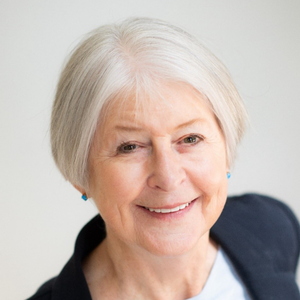
Patricia Jennings
United States
Statement of Interest
My primary discipline is contemplative science in education, where my work focuses on the intersections of social and emotional learning (SEL), mindfulness, and compassion in educational settings. Through a contemplative approach, I seek to enhance the well-being and effectiveness of educators, fostering environments that support both teacher and student development.
Over the years, I have significantly contributed to contemplative science and its application within education. My foundational work, including the prosocial classroom model co-developed with Mark Greenberg, laid the groundwork for integrating SEL and mindfulness into teacher training. This model, which underscores the impact of teachers’ social and emotional competencies on classroom dynamics, is a widely cited and essential resource in educational research. I also pioneered the CARE (Cultivating Awareness and Resilience in Education) program, which has positively impacted educator well-being and student outcomes through large-scale, randomized trials. Supported by substantial federal funding, CARE’s efficacy in reducing teacher stress and enhancing classroom interactions has been well-documented, further establishing its role in mitigating educator burnout and improving student engagement.
Additionally, the CARE program has been recommended by the Centers for Disease Control (CDC) to support educator and school well-being, recognizing its value in addressing critical mental health needs in educational settings. Contributions to the Board and Motivation to Serve: As a board member, I would bring extensive research and implementation expertise in contemplative practices applied to education. My experience leading large-scale initiatives, such as the CARE program and the Compassionate Schools Project, equips me with insights into translating contemplative practices into impactful, evidence-based frameworks. I am passionate about supporting the International Society for Contemplative Research’s mission and believe my contributions can help guide future contemplative research to foster positive changes across educational and social systems.
Director of REACH (Diversity, Equity, Inclusion, Belonging, Accessibility)
The REACH seat focuses on the ISCR commitment to developing an organizational culture that embeds considerations of diversity, equity, inclusion, belonging, and accessibility in everything that we do. The individual also serves as the Chair/Liaison of the REACH committee (Reimagining Equitable and Antioppressive approaches to Contemplative research and Healing).
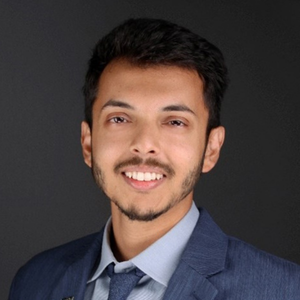
Aproteem Choudhury
United States
Statement of Interest
As the Director of the Greater Houston Healing Collaborative at the Institute for Spirituality and Health, I am committed to advancing contemplative care and research through a public health lens that prioritizes diversity, equity, inclusion, and accessibility. My contemplative research centers on integrating mind-body interventions within clinical and community-based frameworks to foster resilience, mitigate trauma, and reduce health disparities. This approach combines contemplative practices with a deep understanding of public health needs, ensuring culturally responsive support for individuals and communities.
Throughout my career, I have championed accessible and trauma-informed contemplative care across varied settings, from healthcare institutions like CommonSpirit Health (1) and Texas Children’s Hospital (2,3,4) to communities impacted by crisis, such as including Uvalde, TX and Ukraine, with the Center for Mind Body Medicine (CMBM). These programs provide clinicians, patients, and community members with accessible, evidence-based tools to manage stress and cultivate healing. At GHHC, I lead efforts to train over 160 facilitators who have supported more than 50,000 individuals with contemplative practices tailored to diverse cultures through inclusive programs like our FaithHealth Networks (Baptist, Jewish, Islamic, Hindu, SBNR, etc).
My engagement with the Mind & Life Institute, including multiple Summer Research Institutes, the 2018 ISCR, and receiving a Changemaker Grant, reflects my commitment to interdisciplinary, inclusive approaches to contemplative science. As I complete my MSW and move toward my PhD, I am building a practice-informed foundation of DEIA-driven contemplative research.
If selected as the DEIA Director, I would bring a dedication to fostering a culture within ISCR that is inclusive, socially responsible, and transformative. My experience with culturally adapted contemplative programming and community partnership development would support ISCR’s commitment to DEIA, enhancing our capacity to reach and impact diverse populations. I am particularly motivated to contribute to this role because I believe that inclusivity is essential for the growth and sustainability of contemplative research and practice in a multicultural world.
Thank you for considering my application. I am excited about the opportunity to advance ISCR’s DEIA objectives and to help create a welcoming, equitable space for contemplative research and practice.
Director at Large
This position is not tied to a specific discipline or constituency. Directors at large provide a broad perspective, often bringing varied experiences and skills to the board. They can address issues across multiple areas, contributing to strategic planning and governance.
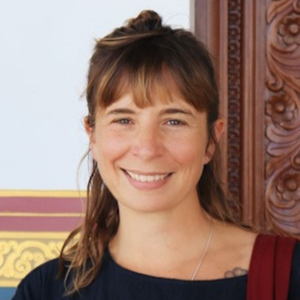
Eve Ekman
United States
Statement of Interest
I am honored to apply for a position on the board of the International Society of Contemplative Research (ISCR). This field is a lifelong passion for me, and I am dedicated to deepening its impact through both personal practice and academic work. My journey began in 2000 when I attended a Mind & Life meeting in Dharamshala with the Dalai Lama, observing alongside my father, Paul Ekman. That experience, where scientists and contemplative practitioners explored human emotions and their power to divide or connect us, left a lasting impression.
Early in my career, working as a medical social worker in the emergency room of a level-one trauma center, I saw compassion in action—and how essential it was to support and sustain it. This led me to pursue further academic training to understand both the barriers and the foundations of compassion in high-stress environments. I completed doctoral training in social welfare, public health, and psychology, followed by postdoctoral studies in integrative medicine. My work always returns me to interdisciplinary approaches, integrating the humanities and sciences, and centered on relieving suffering.
My contributions to contemplative science stem from research, teaching, and personal practice. I am a qualitative researcher and consider myself a story teller for the participant experiences, which often contribute to an emergent and unique understanding of what is being studied. As a principal investigator and contributor, I’ve worked on studies related to burnout prevention, empathy development, emotion awareness, meditation (including Vajrayana visualization practices), and psychedelics. Additionally, I’m passionate about translating scientific insights for the public—something I had the opportunity to do as Director of Training at the Greater Good Science Center. I believe my experience in making science accessible could be valuable to the board’s goal of expanding the reach of contemplative science.
In my recent role as a well-being expert at Apple, I saw firsthand how little industry often understands about the science of consciousness and well-being—and how much this knowledge could enhance the creation of impactful, far-reaching tools.
I feel I can offer the heart of a dedicated Dharma practitioner. Meditation is a central focus of my life and I am fortunate to sit with a teacher weekly, go on retreat several times a year, and support others in their dharma as a teacher in a community based center. In recent years, I have also deepened my practice through the study of Andean cosmology, learning to cultivate kinship and reciprocity with the more than human world.
The inspiration I’ve found in the Mind & Life community has been a highlight of my life, and I feel a similar enthusiasm for ISCR. I would love to contribute my experience across social sciences, technology, and social justice to deepen and broaden the reach of contemplative science. If there’s interest, I’d be happy to apply for either a social sciences position or a general board role. I also hope that ISCR may consider adding technology representation to the committee. It was inspiring to serve on the Reach Committee at the last ISCR event, we have so much potential to create an inclusivity welcoming environment for diverse approaches to research. I believe contemplative science has a unique opportunity to redefine how science is practiced—with a more introspective and embodied approach—and I would love to support our conferences in fostering this vision through the board.
Perhaps my greatest contribution to the board is a genuine sense of care for those I am in community with. Thank you for the consideration.
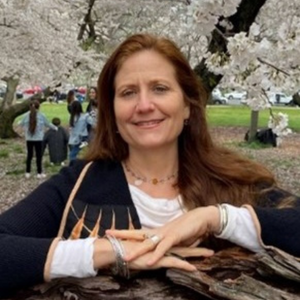
Jennifer Rioux
United States
Statement of Interest
I hold a PhD in Medical and Cultural Anthropology and clinical credentials as a Doctor of Ayurvedic Medicine (NAMA), a Yoga Therapist (IAYT), an East-West Herbalist (AHG), in Trauma- wise Mindfulness (CMBM), in Interprofessional Spiritual Care (ISPEC) in Compassion Cultivation, in Inner Transformation for Social Impact Leaders (Garrison), as a Climate Ambassador (EcoAmerica) and as a Climate Café Facilitator (CPA-NA). Academic work throughout my career has been transdisciplinary in orientation, studying Integrative Medicine as a social movement and traditional, holistic and indigenous medicine practitioners as communities of practice.
I’m Director of Planetary Health at George Washington University Center for Integrative Medicine and a clinician providing whole-person care. I’m Associate Professor affiliate at GW Global Food Institute; GW Climate and Health Institute; and Integrative Medicine Programs. Past positions include Executive Director, Institute for the Study of Integrative Healthcare and Vice Director of GW Integrative Medicine Programs. I completed an NIH, National Center for Complementary and Integrative Healthcare Postdoc Fellowship at University of Arizona School of Medicine where I trained in complex systems science, paradigm-specific research methods, model-valid study designs and worked with U of A Andrew Weil Center for Integrative Medicine.
As an activist-scholar, I have been engaged with advocacy on behalf of the traditional world and indigenous medical systems and their practitioners for several decades. I work to dismantle the power imbalances between these healing systems and the over-culture of technocratic, bureaucratic biomedicine. My goal is to protect and preserve the authenticity, dignity, integrity and sovereignty of these nature-based, root-cause oriented healing systems as they are exposed to transactional, extractive and exploitative relationships with institutions and organizations who believe they are entitled to the knowledge, labor and effort of indigenous medicine practitioners and experts without need for reciprocity, respect or reparations. These healing sciences are inclusive of spiritual causality and myriad contemplative practices and associated methods embedded in land, identity and ritual that require initiation, apprenticeship and long periods of dedicated effort. Decolonizing relations means that engagement with these wisdom- keepers and medicine practitioners must be voluntary, negotiated and on their own terms.
I believe in values-driven scholarship and accessing compassion, self-awareness and contemplation as fuel for empowerment, resistance and transformative social movements. I wish to serve on the Board as a traditional world medicine practitioner, complex systems scientist, and ally of the paradigms and communities that gave rise to the contemplative practices and emancipatory knowledge currently being mined for insights by Western scientists.
Student/Trainee Representative
This seat is reserved for individuals currently in training or graduate programs, such as students, interns, residents, and post-doctoral fellows. The representative can voice the concerns and perspectives of the trainee community, ensuring that the organization’s initiatives support the development and needs of emerging professionals.

Renee Lynn Ford
Europe
Statement of Interest
I, Renée Ford, PhD, wish to nominate myself for the Trainee Director position on the ISCR board. My research in Tibetan Buddhist contemplative practices and early-career standing in the field of humanities naturally aligns with the scope of the international society. As an early-stage career researcher, currently employed at Aarhus University, I will bring my long-term commitment to growing and sustaining contemplative research and engagement with the larger community. Mostly, I wish to see contemplative research continue a growing trajectory to benefit not only academic fields but also implemented in multiple fields.
My interdisciplinary research is best defined in the humanities division, yet I hope to add valuable insights and contributions to the larger field of contemplative research. I have a PhD and master’s degree in Tibetan Buddhist studies. My research focuses on various contemplative practices and how various elements like devotion or prostrations may function or effect the practitioners in those practices. I approach my research with methodologies from religious studies and anthropology and investigate the space between textual and lived-experienced testaments in Tibetan Buddhism. Most recently, I incorporate microphenomenological interviews on a moment of experience of “open-heart” with historical narratives found in Tibetan Buddhist texts. This interdisciplinary approach allows me to understand contemplative research from multiple perspectives, which benefits the scope of ISCR.
